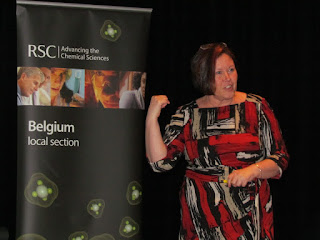Dr. Norman Cecil Lloyd CChem FRSC
Members and
Friends were sadden to hear the news of the sudden death of Dr. Norman Lloyd who passed away in the early hours of Sunday 17 March at home in Lasne. ‘Uncle Norm’ had a long and distinguished global career with Dow Corning and was
a fervent supporter of RSC Belgium including as an active committee member from
2001 to 2006.
Always full of ideas and enthusiasm for chemistry, among many other achievements, he was responsible for organizing a number of excellent excursions (aka Lloyd’s Tours) for the section: including a memorable trip to Luxembourg in 2004.
Norman will be greatly missed by his wife Setsuko,
children Kazumi and Michiko, his extended family, and his many friends and
colleagues.
All Saints’ Church, Waterloo
Chaussée de Charleroi 2
1420 BRAINE-L'ALLEUD
This will be followed by a gathering with friends and family
at the Lloyd’s house in Lasne.
The Norman C. Lloyd scholarship
In lieu of flowers, Setsuko and the family would like donations to be made in the name of ‘Norman C. Lloyd’ to a scholarship
fund that is being established by the Royal Society of Chemistry, Belgium
section.
A donation would have special meaning for the family as the
new scholarship fund is intended to support and encourage students to study
chemistry, a subject very close to Norman ’s
heart.
Details of how to make a donation are given below.
Account name:
Bank:
Account no.:
IBAN
BE91 3630 8144 4876 BIC: BBRUBEBB
Address:
The
Royal Society of Chemistry Belgium
Rue Sainte
Anne 13
1300
WAVRE
Please
indicate that the donation is for the ‘Norman C. Lloyd fund’





